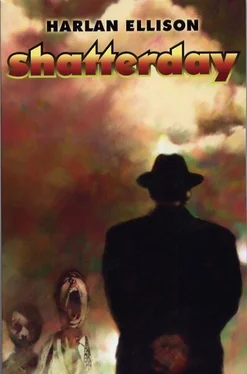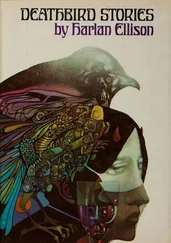The young man reached for an octagonal-shaped stone. The old man stopped him with a word. “No!” The young man pulled back his hand. The old man picked up another one, diamondshaped. “Here. This one.”
“What was wrong with the other one?”
“Wouldn’t have served your need. Take my word for it, this’s the one you want. Two dollars. A steal at twice the price.”
The young man took it from him. It was warm to the touch. He closed his fist around it. The heat grew in his palm. He opened his hand and stared down at the glowing rock. “How do I use it?”
“Just carry it with you. Heat it in your hand from time to time. It’ll do the rest.”
The young man fished around in his jeans pocket, brought up two moist and wrinkled dollar bills. He gave them to the old man. The old man took the bills, walked back to the area where the rocking chair sat under the beaded lamp, and reached into an open drawer. He brought out a ledger and a quill pen.
“I’ll just enter the transaction,” he said. He brought the ledger over to the showcase, laid it down, opened it, and wrote a few words on the first empty line. He looked up from the ledger; the young man didn’t like the look at all. “I’ll need a tear,” the old man said.
“A tear?”
“Yes, a tear.”
“Not blood?”
“Beg pardon?”
“Sign these things in blood; isn’t that supposed to be the way of it?”
“Just a tear, thank you.”
“And how do I do that?”
“No problem.”
The young man suddenly felt his eyes well up with tears. One rolled down his face, hung from his chin for a moment and then dropped onto the glass of the showcase. “Very good,” the old man said, and dipped the quill in the tear. He wrote a few more words.
He closed the ledger slowly, and looked at the young man. “That’s it,” he said. “Anything else?” In fact, it was a dismissal. The young man paused a moment, as if trying to brazen out the instant; but the old man quite clearly did not want him in the shoppe any longer. He turned toward the door. It was clear afternoon out there.
“You wrote down my name, didn’t you?”
“Goodbye,” said the old man. “Come again.”
“How did you know my name? I didn’t say my name.”
“Goodbye.”
The young man got a nasty look on his face and seemed about to say something. He clutched the powerstone in his hand and waited for it to work. But he knew it wouldn’t work on the shoppe keeper. He had once bought a revolver from a pawnbroker, and the hockshop owner had sold him the bullets in a sealed cartridge carton, with a band around it. Shopkeepers always took precautions so the merchandise wouldn’t be turned against them.
The young man walked toward the front door. He had only taken three steps before he was there. But it had been such a long walk to reach the old man.
He put his hand on the knob—a crescent moon—and opened the door. He turned to look back at the old man, but the old man was gone. The light of the beaded lamp no longer shone. It was all darkness back there, with a swirling vortex of white mist where he had last seen the old man standing.
“I’ve read stories about this kind of place,” he said defiantly, to nothingness. There was no answer from the misty vortex. “Nobody ever wrote one about who runs a place like this. Why you sell stuff like this so cheap? What’s in it for you? Why do you keep coming and going like that? Who do you work for? What’s in it for you?”
There was a final whisper of dismissal: Goodbye.
He stepped through the door, closed it behind him, and started away. He took three steps, as he had inside the shoppe, and turned around, thinking better of his purchase.
Where it had been, there was a blank wall between two boarded-up entranceways. As promised, the Shoppe of wonders, in which the filthy young man with the unsavory manner had purchased his heart’s desire, had vanished.
He stabilized his atoms and assumed his normal form. He was not an old man, nor was he a swirling vortex of white mist, nor was he a beautiful woman or a robot or Cernunnos of the Gauls. He was, himself, a young man, perhaps no older than the young man to whom he had sold the powerstone. The thin disc that had been slid between the atoms of the femur of his left leg had one thousand and eleven growth rings on it. He was a young man, only one thousand and eleven years old.
The shoppe solidified around him. Its outer walls were gone. He was back at Rubble Point. The world outside was ashes and darkness. The stasis field held the shoppe inviolate, but though he was safe from the Infinite Dark Mass that pressed against its walls, its potency could still be felt: pressing against the field, incredible devouring power exerting unceasing pressure. Outside the shoppe it was all sky, no land surface, no horizon. Sky, empty space, devoid of life, black, terrible and cold. Ashes and darkness.
He ran his hands wearily through his thick hair, and thought of Ahna.
The time he had spent with the shoppe just off Jamshyd Avenue could be quantified/as thirty-five “minutes.” Subjectively. But he had been gone only a tick in the objectified chronology of Rubble Point.
What he had done suddenly flooded in on him. He was—all at once—as terrified as a child who had broken his mother’s best china figurine. He knew what he had done was wrong! More than simply wrong. It had been personally destructive. But there were times when he could not help himself. It had now put Ahna in jeopardy, as well as himself, but he could not fully regret it; he knew he would do it again if the moment were to be repeated. Despite the job he had to do, despite the purpose that drove him obsessively, there were times when he could not help himself. He was, after all, an artist.
He stood there among the items of stock he had been given to sell, and he thought about his Art. In the face of what he had done, and what it meant for Ahna, he felt vain and foolish. Headstrong. Destructive. He turned and turned, looking for an answer to his actions, but everything in the shoppe spoke reproach. He remembered one special manifestation of his art that he had thought personified what he had to say:
In the Glass Square, having reassembled himself in the shape of a silver tetrahedron radiating light in waves of chromatic brilliance, sending the light through random phases of color in bursts and washes without once repeating the sequence. No one had paid any attention. But he had stayed there for a very long time, and finally, when it was a totality, and he was done, and the time for that particular piece of art to be disassembled, and he reformed himself, one of the Supervisors had solidified in front of him and had asked, “What was the name of that?” And he had said, “Integrity,” and the Supervisor had looked at him without speaking. Then he had vanished. The gentle murmuring of the colors could still be heard faintly, dissipating.
He thought about that despicable young man with the powerstone. He was so anti-Art, so anti-life…
No! He would not think about it. They might not know; they couldn’t be everywhere; they couldn’t know everything; they had too much to supervise, too much to worry about; they would not discover what he had done. That was over, done, finished. He didn’t want to think about it; it made him cold and dead inside to think about it. He wanted to think of Ahna, to think of the time when she would be with him again. He wanted to see Ahna. To reaffirm his purpose, to sublimate his need to create. To force the artist to sleep, so the man could do what he had to do.
He gathered muons to himself, concentrating them in the fingertips of his right hand, and made a sign in the empty air of the shoppe. The air ran and bubbled like lava and a communication frame was created. He looked into it and said, “This is Lhayne. I would like a pass to go to the vaults.”
Читать дальше












